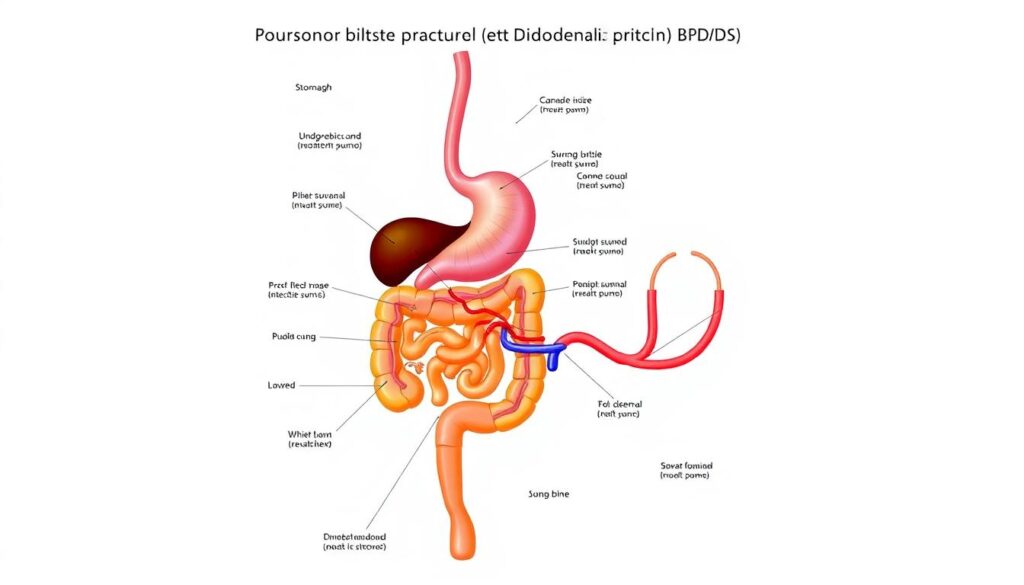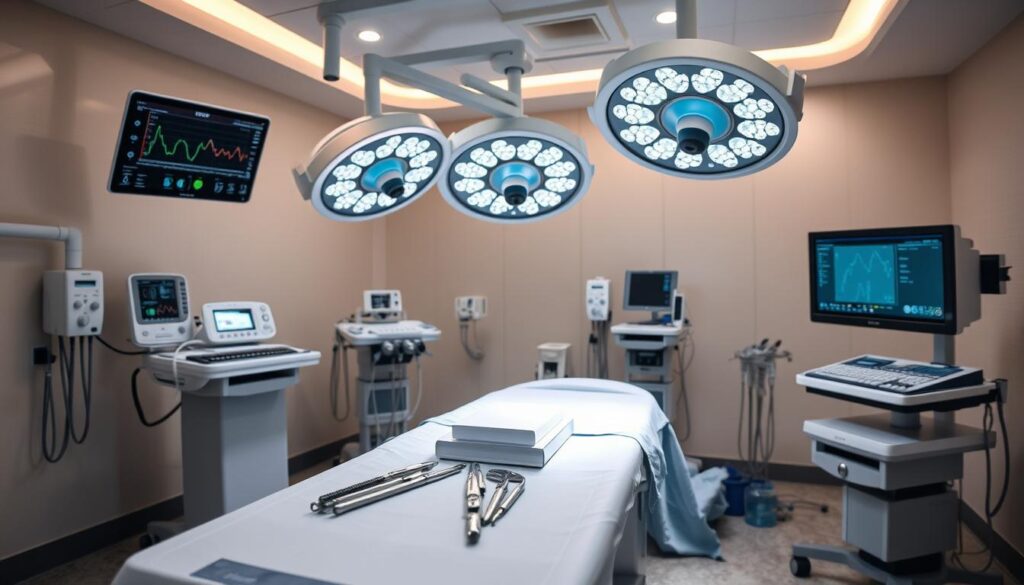If you’ve been struggling with severe obesity, obesity treatment surgery might help. This surgery changes your stomach size and how you feel hungry. It leads to big weight loss and better health.
To get weight loss surgery, you need a high BMI. This means a BMI of 40 or more. Or, a BMI between 35 and 39.9 with health issues like diabetes or high blood pressure. You’ll go through a detailed check to see if you’re right for this surgery.
Key Takeaways
- Obesity treatment surgery, also known as bariatric surgery, can be a life-changing option for individuals with severe obesity who haven’t achieved weight loss through lifestyle changes.
- These surgeries work by altering the size of the stomach and modifying appetite, leading to significant weight loss and improvements in obesity-related health conditions.
- Qualifying for weight loss surgery typically requires a BMI of 40 or higher, or a BMI between 35 and 39.9 with at least one weight-related health issue.
- The screening process involves a comprehensive evaluation of your physical and emotional health, including nutritional assessments and tests for eating disorders.
- Obesity treatment surgery can be a transformative solution, but it’s important to understand the risks and commit to lifestyle changes for long-term success.
Understanding Obesity Treatment Surgery and Its Impact
Bariatric surgery is a top choice for treating severe obesity. It changes the stomach’s size and function. Sometimes, it also bypasses part of the intestine. People who get this surgery often lose a lot of weight.
They also see better control over diabetes and need less medicine for blood pressure and diabetes.
Definition and Medical Importance
Bariatric surgery helps people with severe obesity lose weight and get healthier. It changes the stomach and sometimes the intestine. This can lead to a lot of weight loss.
It can also make health problems like diabetes and high blood pressure better.
Who Qualifies for Weight Loss Surgery
People with a Body Mass Index (BMI) of 40 or more might get surgery. Those with a BMI of 35 to 40 and health problems might also qualify. Sometimes, a BMI of 30 with diabetes can also lead to surgery.
The Evolution of Bariatric Procedures
Bariatric surgery has changed over the years. Now, there are many types of surgery to fit different needs. Common ones include gastric sleeve, gastric bypass, and adjustable gastric banding.
Each surgery has its own benefits and risks. It’s important to talk to a doctor about which one might be best.
“Bariatric surgery is the most effective long-term treatment for severe obesity, leading to significant weight loss and improved management of obesity-related conditions.”
The Comprehensive Pre-Surgery Evaluation Process
Choosing weight loss surgery is a big step. It needs a lot of preparation and checks. The checks before surgery are detailed and cover many areas. They make sure patients are ready for the journey ahead.
First, patients meet with a team of doctors. This team includes internists, dietitians, and surgeons. They look at the patient’s health history and do tests. This helps find any health issues that might affect the surgery.
Another important part is the mental check. Doctors want to know if patients are ready for big lifestyle changes. Patients might also join support groups to ask questions.
Before surgery, some doctors might ask patients to lose weight or manage their blood sugar. This can make the surgery safer and more successful.
The whole process is to make sure patients are ready, body and mind. It tackles all possible issues before surgery. This way, the team can help patients reach their goals and get healthier.
| Key Elements of Pre-Surgery Evaluation | Purpose |
|---|---|
| Medical History Review | Identify underlying health conditions and risk factors |
| Physical Examination | Assess overall health and fitness for surgery |
| Blood Tests | Evaluate nutritional status and screen for deficiencies |
| Psychological Evaluation | Assess readiness and commitment to lifestyle changes |
| Nutritional Counseling | Prepare patients for post-surgery dietary adjustments |
| Support Group Participation | Address questions and concerns about the surgery and recovery |
Gastric Sleeve Surgery: A Popular Modern Solution
Gastric sleeve surgery is a top choice for weight loss. It makes the stomach smaller, like a banana. This limits how much food you can eat and changes hunger hormones.
How the Procedure Works
A surgeon makes the stomach smaller during a sleeve gastrectomy. They remove most of the stomach, leaving a narrow sleeve. This limits food intake and changes hunger hormones.
Benefits and Expected Outcomes
- Substantial weight loss: Patients lose about 60% of excess weight in 2 years after sleeve gastrectomy.
- Improved obesity-related conditions: The surgery helps with type 2 diabetes, high blood pressure, and sleep apnea.
- Expanded food choices: The vertical gastric sleeve lets patients eat a variety of foods, unlike other surgeries.
Recovery and Lifestyle Changes
Recovery from a sleeve gastrectomy is quick and less painful than other surgeries. But, patients must follow a strict diet for life. They might also get side effects like GERD. Regular doctor visits and taking nutritional supplements are key for success.
“Gastric sleeve surgery has been a game-changer for many of my patients, helping them achieve significant and sustained weight loss, as well as improvements in their overall health and quality of life.”
– Dr. Ragui Sadek, Bariatric Surgeon
| Procedure | Weight Loss After 1 Year | Risks and Complications |
|---|---|---|
| Sleeve Gastrectomy | 38-87 pounds | Gastroesophageal reflux disease (GERD), nutritional deficiencies |
| Gastric Bypass | 60-80 pounds | Dumping syndrome, intestinal blockage, hernias |
| Adjustable Gastric Banding | 40-60 pounds | Band slippage or erosion, persistent vomiting |
Gastric Bypass: The Gold Standard in Obesity Treatment Surgery
Roux-en-Y gastric bypass is a top choice for weight loss surgery. It makes a small stomach pouch and changes the small intestine. This leads to less calorie absorption and quick weight loss.
People who get this surgery can lose about 70% of their extra weight. They also see big improvements in health issues like type 2 diabetes and high blood pressure. The surgery’s success lasts for up to 20 years, with 50% of weight loss kept.
But, there are risks like not getting enough nutrients and “dumping syndrome.” To avoid these, patients must follow a special diet and take supplements forever. They need help from their healthcare team.
At UCLA, our skilled surgeons use the latest Roux-en-Y gastric bypass method. They do it laparoscopically for less hospital time, quicker healing, and less scarring. Our COMET team offers full care before and after surgery. This helps patients reach their weight loss goals and get healthier.
“Roux-en-Y gastric bypass is considered the gold standard of weight loss surgery, offering exceptional and lasting results for our patients.”
If you’re fighting obesity and looking at surgery options, consider Roux-en-Y gastric bypass. It can change your life. Contact our team to find out more about this surgery and how it can improve your health.
Adjustable Gastric Banding: A Reversible Option
Looking for a way to treat obesity that you can reverse? Adjustable gastric banding, or the Lap-Band, might be for you. It uses a silicone band to make your stomach smaller. This limits how much you can eat. You can adjust the band to fit your needs.
Procedure Overview
The Lap-Band surgery is done with small cuts. It’s less invasive than other surgeries. The surgeon puts the band around your upper stomach. This makes a smaller pouch for food.
The band can be changed to help with weight loss. This is done through a special port under your skin.
Advantages and Limitations
- Simpler surgery with quicker recovery
- Less risk of nutritional problems
- Weight loss is slower, about 40-50% in two years
- More complications can lead to band removal
Long-term Success Rates
The Lap-Band was once popular for weight loss. But now, it’s used in only 0.9% of bariatric surgeries in the U.S. This is because it doesn’t work as well in the long run.
It can take two to five years to reach your weight goal. You’ll need to see doctors regularly for check-ups.
The Lap-Band is a reversible option for obesity. But, it’s not as effective as other surgeries. Think about the pros and cons before choosing it.
Biliopancreatic Diversion with Duodenal Switch
For those with severe obesity, the BPD/DS procedure is a big help. It was first used in 1979 by Scorpinaro. This surgery makes your stomach smaller and changes how your intestines work. It helps you lose more weight than many other surgeries.
BPD/DS is for people with a BMI over 50 or those with serious health problems because of their weight. It changes how your body makes hunger hormones and helps control blood sugar. But, it might cause some health problems and you might need to take extra vitamins.
- The biliopancreatic diversion with duodenal switch (BPD/DS) is a complex bariatric procedure that combines stomach reduction and intestinal rerouting.
- BPD/DS is typically recommended for individuals with a BMI greater than 50 or those with severe obesity-related health concerns.
- This malabsorptive surgery can lead to significant weight loss, often resulting in the loss of 70% to 80% of excess weight within two years.
BPD/DS can help with severe obesity by changing how your body works. It can help with many health problems like diabetes and high blood pressure. It can even help with sleep apnea, making life better for those who have it.
“Bariatric surgery has improved outcomes over time, with laparoscopic procedures surpassing open surgery in terms of decreased wound complications, incisional hernias rates, length of stay, and overall mortality.”
It’s very important to talk about the risks and benefits of BPD/DS with a doctor. Knowing what this surgery does can help you decide if it’s right for you. It’s a big step towards better health and happiness.

Comparing Different Surgical Approaches
Understanding the differences in bariatric surgery is key. Each method has its own benefits and risks. Knowing these can help you choose the right surgery for you.
Success Rates and Weight Loss Expectations
Gastric bypass and sleeve gastrectomy lead to big weight loss. People lose 60-70% of extra weight. Adjustable gastric banding results in less weight loss, about 40-50%.
The Biliopancreatic Diversion with Duodenal Switch (BPD/DS) is the most effective. But, it also has more risks.
Risk Factors and Complications
Bariatric surgeries can change lives but come with risks. Nutritional problems, dumping syndrome, and more surgeries are common. Gastric banding might need more fixes, while gastric bypass can have intestinal issues.
Choosing the right bariatric surgery comparison depends on your health, goals, and what you prefer. Talking to a healthcare expert is crucial. They can help pick the best surgery for you.
Post-Surgery Life: What to Expect
Starting your bariatric surgery recovery is a big change. It’s the start of a new chapter in your life. You’ll see big changes that help you live healthier and happier.
Right after surgery, you’ll eat only liquids. Then, you’ll move to soft foods and finally, solid foods. This slow change helps your body adjust and avoid problems.
- Drink at least 64 ounces of fluid every day.
- Try to eat 60 to 100 grams of protein daily.
- You’ll need to take vitamins and minerals like multivitamins, Vitamin B12, and Iron.
Start moving gently and slowly get more active as you heal. Try to walk for 30 minutes a day. This helps you lose weight.
“Walking frequently is recommended after surgery, with a goal of an average of 30 minutes per day of moderate exercise.”
See your doctors often to check on your health. You’ll go more often in the first year. Then, it’s once a year.
Be open to change and follow your doctor’s advice. Be kind to yourself as you go through this. With hard work and support, you can see great changes in your life.

Nutritional Considerations and Dietary Changes
After bariatric surgery, eating right is key. Patients need to change how they eat to lose weight and stay healthy. They must take vitamins and minerals for life and plan meals carefully.
Vitamin and Mineral Supplementation
Vitamins and minerals are often missing after bariatric surgery. Taking supplements is vital to stay healthy. You’ll need multivitamins, calcium, vitamin D, iron, and vitamin B12.
Meal Planning and Portion Control
Patients should eat small, frequent meals after surgery. These meals should be full of nutrients and protein. Stay away from sugary and fatty foods to avoid problems.
Drinking water is good, but not during meals. This helps avoid filling up the small stomach too much.
| Nutrient | Importance for Bariatric Patients |
|---|---|
| Protein | Supports muscle mass, wound healing, and overall health |
| Iron | Prevents anemia, a common complication after malabsorptive surgeries |
| Calcium | Maintains bone health and prevents osteoporosis |
| Vitamin B12 | Crucial for red blood cell formation and neurological function |
By focusing on bariatric nutrition and planning meals well, patients can manage their diet after surgery. This helps them keep weight off and stay healthy.
Long-term Health Benefits and Outcomes
Bariatric surgery helps a lot more than just losing weight. It can fix problems like type 2 diabetes and high blood pressure. It also helps with sleep apnea and high cholesterol.
Studies show it can even make people live longer. People feel better, move more, and enjoy life more after surgery.
To keep these benefits, you need to keep up with a healthy lifestyle. Eating right, exercising, and seeing your doctor often are key. This helps you stay healthy for a long time.
Impressive Outcomes
The results of bariatric surgery are amazing. Here are some numbers:
- People who had Roux-en-Y gastric bypass surgery lost 31.5% of their weight after 3 years. 67.5% of them got rid of type 2 diabetes.
- It was found that bariatric surgery cut down on deaths by 40%. It also lowered deaths from heart disease and diabetes by 49% and 92%, respectively, over 7.1 years.
- People who had surgery did better in losing weight and improving their health markers like cholesterol and blood pressure. They also did better with diabetes and heart disease risk.
These numbers show how powerful bariatric surgery is. It can really change lives and fight the obesity problem.
Bariatric surgery does more than just help you lose weight. It tackles the real causes of obesity and related health issues. This gives people a fresh start and a chance for better health and happiness.
Physical and Emotional Support After Surgery
Starting a bariatric surgery journey changes your life. You’ll need ongoing support for your success. You’ll face physical and emotional changes.
Having a good support system is key. It helps you through the big changes you’ll see.
Your care team will watch over your health. They’ll check on you, help with food, and guide your exercise. This keeps you healthy and safe.
But, your mental health matters too. Many programs offer groups and counseling. They help with feelings about your body, changes in relationships, and new habits.
You’re not alone in this. Talking to a therapist, joining a group, or talking to loved ones helps. With the right support, you can beat any challenges and reach your health goals.

